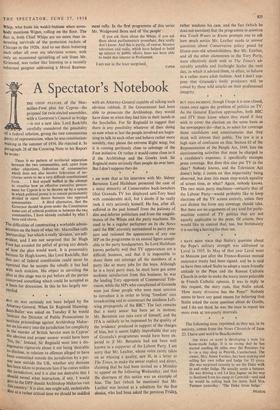BUT THIS INCIDENT, though I hope it is now closed,
raises once again the problem of politics on TV. As the General Election approaches, both BBC and ITV must know where they stand if they wish to cover the election on the same basis as the newspapers do—that is, to select for coverage those candidates and constituencies that they think will interest their public. The law is in a high state of confusion on this; Section 63 of the Representation of the People Act, 1949, lists the electioneering activities that must be charged to a candidate's expenses; it specifically exempts press coverage. But does this also put TV in the clear? Nobody knows, and the Television Act doesn't help; it insists on 'due impartiality' being observed, but does this mean stop-watch equality of screen time, or what? Again, nobody knows. The two main party machines—certainly that of the Labour Party—would probably like to keep elections off the TV screen entirely, unless they can dictate the form any coverage should take. But there are no arguments of any kind for party- machine control of TV politics that are not equally applicable to the press. Of course, they would like to control that, too, but fortunately it is too big a herring for their net.
4.


































 Previous page
Previous page